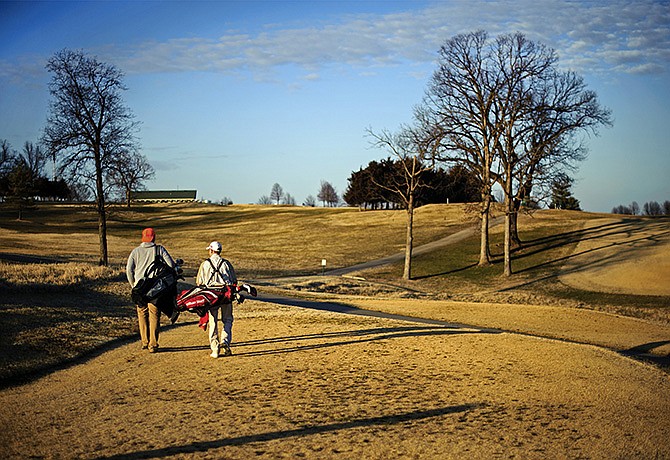Oak Hills Golf Center might start selling alcohol as soon as April.
At the Oak Hills Golf Course Advisory Committee meeting Wednesday, the committee voted to recommend to the full Jefferson City Parks and Recreation Commission the sale of alcohol, primarily beer, at the course.
Oak Hills, the city's only public golf course, never has sold beer or other alcoholic beverages because of a condition of the original donation.
Philanthropist Arthur Hough donated 50 acres in 1917 for the city to use as a park. One of the restrictions Hough placed on the deed stated: "No beverages containing any quantity of alcohol or the substitute shall ever be used or drunk on said grounds."
Some people believe Hough's heirs signed a quit claim deed to free the land of restrictions in 1952, but no record of the deed can be found at the Cole County Recorder of Deeds office.
The city filed a lawsuit in 1991 in hopes of condemning the property and causing it to revert back to the city without restrictions, but the City Council backed off when public opposition formed.
"This has been an ongoing issue for 30 or 40 years, at least," said Tina Werner, general recreation and support services division director.
Bryan Wolford, assistant city attorney, said instead of actively seeking to clear the title of restrictions, they would take a more passive approach by simply allowing the alcohol sales to start and seeing if any Hough heirs decide to take action. Wolford said he was confident any legal action would end in the city's favor, adding the statute of limitations on land issues is 10 years.
Wolford pointed to the following state statute: "No action for the recovery of any lands, tenements or hereditaments, or for the recovery of the possession thereof, shall be commenced, had or maintained by any person, whether citizen, denizen, alien, resident or nonresident of this state, unless it appears that the plaintiff, his ancestor, predecessor, grantor or other person under whom he claims was seized or possessed of the premises in question, within ten years before the commencement of such action."
When asked about the worst-case scenario, Wolford said it would only be an annoyance to him for two months while he defended the action in court, adding he didn't see any legal or logical way a court could get around the 10-year limit.
One committee member then asked about the public perception of violating the original conditions of the donation. Wolford said those have been violated by the patrons who bring their own alcohol onto the property to drink; the fact it is no longer called Hough Park, as required by the original restrictions; and a promised road through the property was never built.
Werner said a survey of the course's patrons showed nearly 82 percent were in favor of the course selling alcohol. Bill Plank, a member of both the committee and the Parks and Recreation Commission, said that figure helps support the move, as his role in making decisions is to represent the public. Plus, he said, drinking is already happening on the course, and by selling it officials will have more control over the situation.
"People are drinking here," Plank said. "This gives us a better way to control it."
The committee's recommendation will be reviewed by the Parks and Recreation Commission at its next regular meeting in March. Werner said they hope to start selling alcohol by April, noting there will be some startup costs, including $11,000 for new coolers, $75 per year for a liquor license and about $3,700 for increased personnel.
Werner said selling alcohol is estimated to generate about $32,000 annually, which would help cut down the amount needed to subsidize the course.

